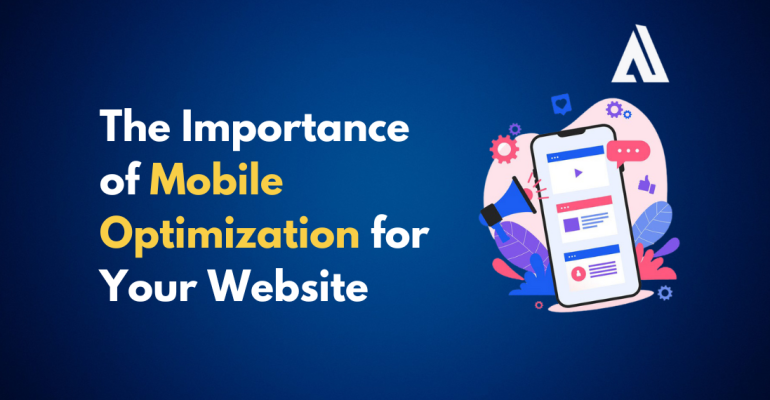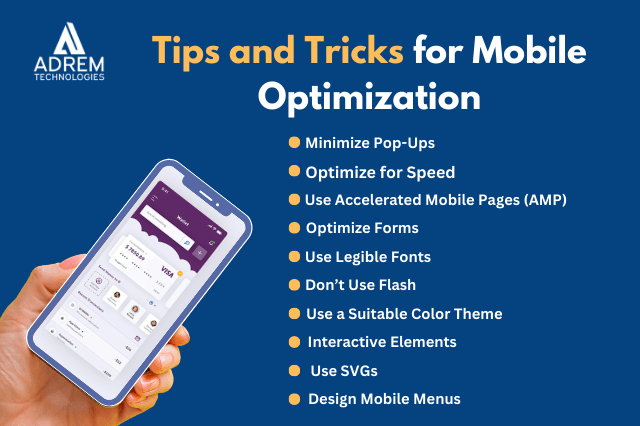The Importance of Mobile Optimization for Your Website

The Importance of Mobile Optimization for Your Website
Businesses need to have a strong online presence in the current digital era, and a significant aspect of that is having a mobile-optimized website. With more and more people accessing the internet through their smartphones and tablets, mobile optimization is no longer just an option – it’s a necessity.
A mobile-friendly website provides a better user experience and can improve your search engine rankings and drive more traffic to your site. By investing in mobile optimization, businesses can ensure that their website is accessible and engaging to users across all devices, helping them to reach and engage with their customers more effectively.
In this blog, we’ll discuss the importance of mobile optimization for your website, the best way to optimize a website, some tips and tricks, and other main things that make your website mobile-friendly.
Why is Mobile Optimization Important?
Mobile optimization is essential for businesses that want to attract and retain customers online. By providing a better user experience, improving search engine rankings, and staying ahead of the competition, businesses can leverage the power of mobile optimization to reach and engage with their target audience effectively.
Below are some reasons that show why mobile optimization is important for your website.
-
Increased Mobile Usage
According to Statista, in 2021, mobile devices accounted for over 50% of website traffic worldwide. The usage of smartphones and tablets for browsing the internet is expected to continue growing, which means more people will rely on these devices for online access.
-
Better User Experience
Mobile optimization ensures your website is user-friendly and easy to navigate on smaller screens. In addition, visitors to your website are more likely to stay longer and engage with your content if they can easily find what they’re looking for and the site loads quickly.
-
Higher Search Engine Rankings
Google considers mobile-friendliness as a factor in its search engine rankings. Therefore, a website adapted for mobile devices will likely rank better in search engine results pages (SERPs) and draw in more visitors.
Read More: Why is Mobile App Development Essential for Any Business in 2023?
What Is the Best Way to Optimize Website?
There are several ways to optimize your website for mobile devices, including:
-
Use a Responsive Design
With a responsive design, your website’s layout and content adjust based on the screen size, ensuring that your website looks and functions well on all devices.
-
Compress Images and Files
Large images and files can slow down your website’s loading speed, negatively impacting the user experience. Compressing images and files can help reduce their size without compromising quality, resulting in faster loading times.
-
Simplify Navigation
Simplifying your website’s navigation can make it easier for mobile users to quickly find what they are looking for. Keep your menu simple and easy to navigate, and use large buttons for calls to action.
-
Optimize Content
Ensure your website’s content is optimized for mobile devices using legible fonts, concise language, and mobile-friendly formatting. Avoid using large blocks of text or complex layouts that can be difficult to read on smaller screens.
-
Test Your Website
Testing your website on different devices and screen sizes can help you identify and fix any issues impacting the user experience. To evaluate your website’s mobile friendliness and pinpoint areas for improvement, use tools like Google’s Mobile-Friendly Test.
What Are the Main Factors in Optimizing a Website?
There are several key factors to consider when optimizing a website:
| Factors | Description |
| Page Speed | Fast loading times are essential for providing an optimal user experience. You can improve your website’s page speed by optimizing images and files, caching, and minimizing HTTP requests. |
| Mobile Optimization | Optimizing your website for mobile users is essential with the increasing usage of mobile devices. This includes simplifying navigation, responsive design, and optimizing content for smaller screens. |
| User Experience (UX) | A good user experience is critical for engaging and retaining visitors. Ensure your website is easy to navigate, has clear calls to action, and provides valuable and relevant content. |
| Search Engine Optimization (SEO) | Optimizing your website for search engines can help improve your visibility in search engine results pages (SERPs). This includes using relevant keywords, meta descriptions, and alt tags, among other things. |
| Security | A secure website is essential for protecting user data and maintaining the integrity of your website. Ensure that your website has an SSL certificate, uses strong passwords, and keeps your website’s software up to date. |
| Accessibility | A website accessible to all users is essential for providing an inclusive user experience. This includes using alt tags for images, providing video captions, and using clear and easy-to-read fonts. |
10 Tips and Tricks for Mobile Optimization
Here are some tips and tricks for mobile optimization:
 1. Minimize Pop-Ups
1. Minimize Pop-Ups
Pop-ups can be particularly annoying on mobile devices where screen space is limited. Consider minimizing the number of pop-ups on your website or avoiding them altogether.
2. Optimize for Speed
Slow-loading websites can frustrate visitors and cause them to leave your site. Optimize your website for speed by minimizing the number of HTTP requests, compressing files, and using a content delivery network (CDN) to reduce load times.
3. Use Accelerated Mobile Pages (AMP)
AMP is an open-source initiative designed to improve the speed and performance of mobile websites. It uses simplified HTML and prioritizes content over ads and other non-essential elements, resulting in faster loading times.
4. Optimize Forms
Mobile users may be hesitant to fill out long forms, so optimize your forms by keeping them concise. Use autofill options and provide clear instructions to make the process as easy as possible.
5. Use Legible Fonts
Using a legible font is essential for ensuring your content is easily read on smaller screens. Choose a font that is easy to read and sized appropriately to ensure that it’s easy to read on any device.
6. Don’t Use Flash
Flash is not supported on many mobile devices and can significantly slow down your website. Instead, use HTML5 and other modern web technologies that are mobile-friendly and perform well on mobile devices.
7. Use a Suitable Color Theme
The right color scheme is essential for creating a visually appealing and accessible website. By using a high-contrast color scheme, limiting the number of colors, using color to highlight important elements, considering cultural associations, and testing your color scheme, you can create a website that engages and retains visitors while being accessible to all users.
8. Interactive Elements
Designing interactive elements for mobile devices requires careful consideration of size, spacing, labeling, and testing. By using large buttons, leaving enough space, using clear labels, and testing your interactive elements, you can create a website that is easy to navigate and interact with on any device.
9. Use SVGs
Using SVGs is an excellent way to optimize your website for mobile devices. Use SVGs for simple graphics, use CSS to style them, optimize them for performance, use inline SVGs to reduce HTTP requests, and test them on different mobile devices.
10. Design Mobile Menus
Designing a mobile menu requires careful consideration of design and usability. For example, use a hamburger icon, keep it simple, use a drop-down menu, make it easy to close, and test your menu on different devices.
Following these tips, you can create a website that looks great and performs well on any device.
Final Thoughts
The shift towards a mobile-first world is a reality that businesses cannot ignore. With more people using mobile devices to access the internet, websites that are not optimized for mobile are at a disadvantage.
In addition to the user experience and engagement benefits, mobile optimization is critical for SEO. Search engines like Google give preference to websites that are mobile-friendly in their search results and penalize those that are not.
Optimizing your website for mobile can improve the user experience, increase engagement, and boost your search engine rankings. This can translate into more traffic, leads, and sales for your business.
With the correct mobile optimization techniques, you can make sure that your website functions well and is simple to use on smaller screens, helping you differentiate yourself from the competition.
You can also contact Adrem Technologies at info@localhost and get the best mobile development services. So, why wait? Contact us now.

